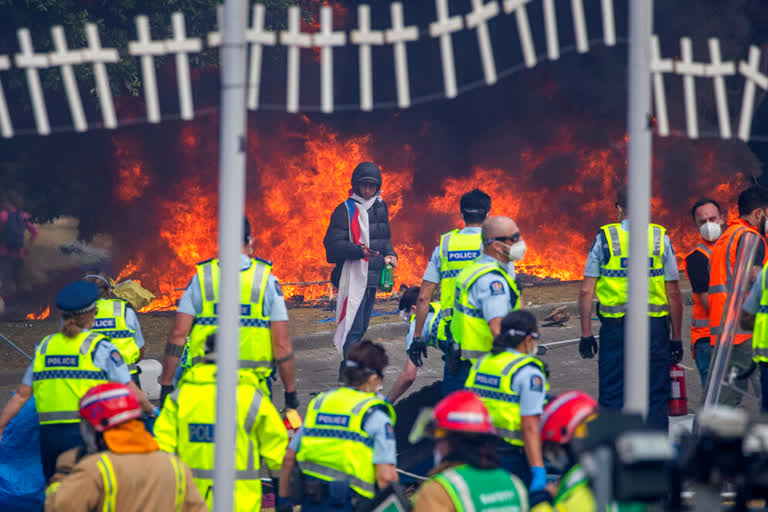WELLINGTON: Anti-Coronavirus vaccine protestors on Wednesday set on fire tents mattresses and chairs as they retreated from their protest against the vaccine mandate norms. A cloud of thick black smoke billowed across the grounds of New Zealand's Parliament and sirens blared after the police broke up the camp that protesters first set up more than three weeks ago.
Police retook control of the Parliament grounds although dozens of protesters remained in nearby streets, some hurling objects at officers. Parliament's once carefully manicured grounds were left scarred, a children's slide in ruins. New Zealand Prime Minister Jacinda Ardern said that in planning the operation, police had expected hostility, resistance, and violence — but it was another thing entirely to witness it.
"I was both angry and also deeply saddened. To see the Parliament — your Parliament, our Parliament — desecrated in that way, and a children's playground destroyed, by a small group of illegal protesters," Ardern said. "But, as I say, it's not something that will define New Zealand's response to this pandemic."
Earlier, police wearing riot gear and using pepper spray had moved in on hundreds of people who had been occupying the grounds and surrounding streets. Police efforts in the morning focused on the periphery of the protest before turning to the main camp in the afternoon.
It was the most significant use of force to date by authorities against the demonstrators. As they retreated in the afternoon, they tossed objects onto several fires, which police doused with water hoses.
Protesters said in a statement they were united in wanting mandates dropped and to make their own informed choices regarding their health, free from coercion and punishment. They said the vast majority of protesters had been well-behaved and had chosen to camp as a last resort after other options for dialogue were quashed.
The operation began at dawn when police started telling people over loudspeakers they were trespassing and needed to leave, while officers tore down tents in peripheral areas and a police helicopter circled overhead. Some protesters confronted the police and used milk to try and clear their eyes from pepper spray.
Police also towed some of the 300 or so cars, vans, and trucks that protesters have used to block streets. The convoy was inspired by similar protests in Canada and has sparked other rallies around New Zealand, leading to a more charged political atmosphere.
Ardern's security detail has been increased after protesters heckled her at events, including as she was leaving a school visit in Christchurch last week.
Police Commissioner Andrew Coster told reporters they had brought in several hundred additional officers from around the country for the operation, which would continue until all the vehicles and tents were gone.
Coster said some protesters had sprayed fire extinguishers and thrown paint at officers as they advanced, and others had used makeshift shields and barricades. He said a laser pointer was aimed at the police helicopter.
By evening, police reported that they had towed about 50 vehicles and another 30 had left. They had arrested 65 people for trespassing, causing damage, and carrying weapons. And three officers had been treated at a local hospital for non-life-threatening injuries.
Coster said officers decided to move in because previously constructive talks with protest leaders weren't progressing and many genuine protesters had left and been replaced by people more intent on violent confrontation.
"I was very clear of our approach, which was to de-escalate. There is no interest from anyone here of turning this into a fight," Coster said. "However, this protest has tipped over a balance and it now needs to end."
Ardern on Wednesday said the protest had been fueled by misinformation and conspiracy theories. She also pointed out that COVID-19 had spread at the protest and some protesters had been hospitalized.
Lawmakers across all parties had refused to meet with the protesters.
Last week one protester drove a car toward a police line, narrowly avoiding officers, and police said some of the protesters had thrown human feces at them.
Before Wednesday's operation, police had arrested 132 protesters and laid various charges against some of them.
Protesters have been well organized, setting up tents on the lawns outside Parliament and trucking in portable toilets, crates of donated food, and bales of straw to lay down when the grass turned to mud. They even dug a vegetable garden, set up a daycare tent, and assembled makeshift showers as they signaled their intent to stay for a long time.
At one point, Parliament Speaker Trevor Mallard turned on the sprinklers and blasted Barry Manilow tunes in a failed effort to make them leave.
New Zealand is experiencing its biggest outbreak since the pandemic began as the omicron variant spreads. On Wednesday, health authorities reported a record 22,000 new daily cases.
Ardern has said she plans to begin easing virus mandates and restrictions after the peak of the omicron outbreak has passed.
About 77% of New Zealand's population is vaccinated with two doses.
Since the beginning of the pandemic, New Zealand has reported fewer than 100 virus deaths among its population of 5 million, after it imposed strict border controls and lockdowns to eliminate earlier outbreaks.
Also read: New Zealand PM Jacinda Ardern cancels her wedding amid Omicron surge



